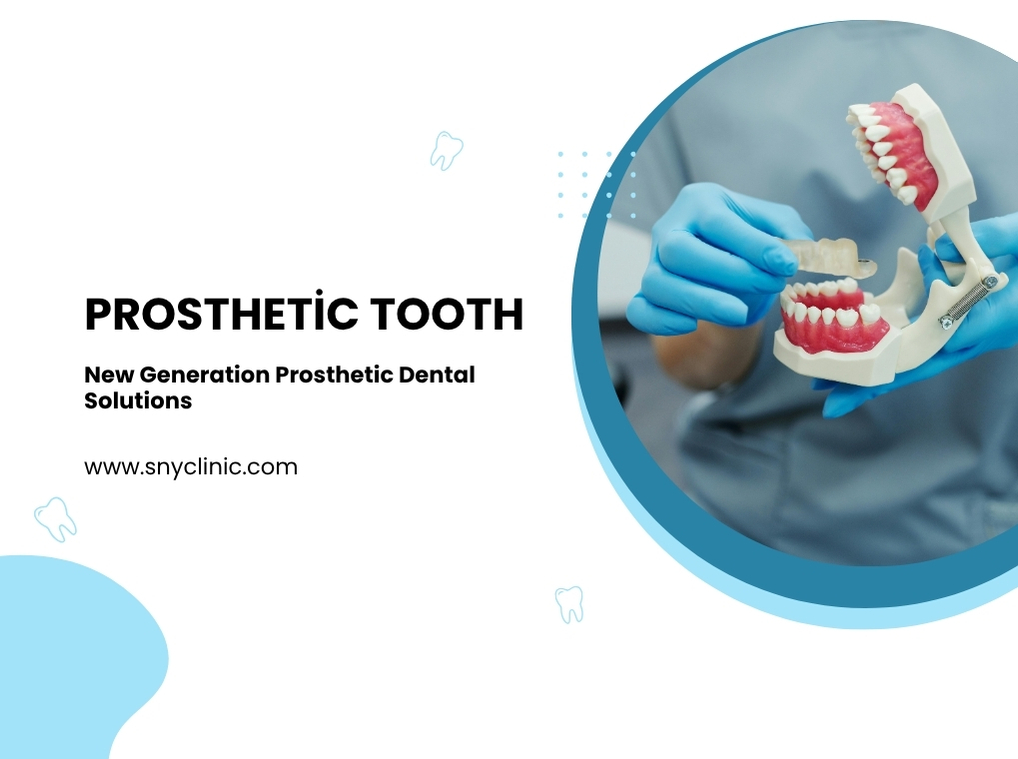
New Generation Denture Solutions
New Generation Denture Solutions
Smiling is one of the most sincere and powerful forms of communication in life. However, tooth loss can overshadow this natural expression, impair chewing function, and negatively impact overall quality of life. Fortunately, modern dentistry offers permanent solutions to this problem through denture treatments that replace lost teeth, providing complete solutions both aesthetically and functionally.
What Are Dentures and Why Are They More Than Just an Aesthetic Need?
Dentures are artificial teeth specially designed to replace one or more missing teeth and surrounding tissues due to various reasons. Commonly known as "false teeth," these solutions are now custom-made using today's technology, making them almost indistinguishable from natural teeth.
The problems caused by tooth loss are not limited to aesthetic concerns; on the contrary, they bring along a series of functional and structural issues that significantly affect quality of life:
• Loss of Function: Chewing and speaking abilities weaken.
• Deterioration of Jaw Structure: The gap caused by missing teeth can lead to adjacent teeth shifting into that space. Similarly, the opposing teeth may elongate toward the gap. These shifts and elongations can disrupt the normal occlusion, leading to pain in the jaw joint, clicking sounds, and movement difficulties.
• Digestive Issues: Inadequate chewing may lead to gastrointestinal problems.
• Psychological Effects: It can cause loss of self-confidence and withdrawal from social life.
For this reason, denture treatment is not only a smile restoration but also a critical step toward maintaining overall oral and systemic health.
Modern Types of Dentures
Denture applications are tailored according to each individual's oral structure, number of missing teeth, and personal needs. The type of denture to be used is determined based on the patient’s aesthetic expectations and functional requirements. Thus, each treatment is personalized. Denture solutions are classified into two main categories based on usage: removable and fixed dentures.
1. Removable Dentures
These are dentures that the patient can insert and remove themselves. They are preferred in cases with multiple tooth loss or insufficient bone support for fixed dentures.
• Full Dentures (Complete Dentures): Used when no natural teeth remain in the mouth. Prepared separately for the upper and lower jaws. Consist of an acrylic base (palate) and artificial teeth placed on it. They stay in place through the vacuum effect of the palate in the upper jaw and tongue movements in the lower jaw.
• Partial Dentures: Preferred when some natural teeth remain. These dentures replace the missing teeth and support both aesthetics and functionality. They attach to existing teeth using metal or aesthetic clasps.
• Clasps (Traditional Partial Dentures): Known for their metal clasps, these are the most common type of partial dentures. Although functional, the visibility of metal clasps, especially on front teeth, may cause aesthetic concerns.
• Precision-Attached Dentures: Instead of clasps, they attach using “snap-on” precision attachments hidden within crowns on existing teeth, offering a more aesthetic solution.
2. Fixed Dentures
These are dentures permanently attached by a dentist, and the patient cannot remove them. This type is often used when one or a few teeth are missing.
• Crowns and Bridges: A “crown” is used for single-tooth restoration, while “bridges” are used to replace one or more missing teeth by anchoring to neighboring teeth.
3. Implant-Supported Dentures: The Pinnacle of Modern Dentistry
This most recent approach combines the advantages of both fixed and removable dentures. These dentures are supported by titanium screws (implants) integrated into the jawbone. Implants act as natural tooth roots, providing greater stability and longevity.
• Implant-Supported Fixed Dentures: These consist of porcelain bridges permanently screwed or cemented onto a sufficient number of implants. They aim to feel and look like natural teeth.
• Implant-Supported Removable Dentures: Especially used in completely edentulous patients to stabilize the lower denture. These dentures are secured to 2 or 4 implants using a "snap-on" system. Patients can remove them for cleaning, but they stay firmly in place during the day.
Step-by-Step Denture Treatment Process
The treatment process usually takes a few sessions, with patient comfort prioritized at every step.
• Initial Examination and Planning: The dentist evaluates your oral and dental health in detail using clinical examination and imaging techniques like X-rays. Based on this assessment, the most suitable denture type is selected and a personalized treatment plan is created.
• Taking Impressions: Precise and detailed impressions are taken to create an exact model of your jaw, ensuring a perfect fit and optimal comfort.
• Trial Sessions: Before finalizing the denture, the color, size, alignment of the teeth, and compatibility with the palate are checked. Your input and approval are critical at this stage.
• Delivery and Adjustments: After successful trials, your denture is delivered. The dentist provides detailed instructions on usage and care. Follow-up appointments are scheduled for minor adjustments if needed.
Living with Dentures: Care, Longevity, and Key Tips
Wearing new dentures requires an adjustment period. You may feel fullness in the mouth, difficulty in pronunciation, or increased saliva at first. These symptoms typically subside within a few weeks. Patience and adherence to your dentist’s recommendations are crucial during this time.
Golden Rules for Denture Care:
• Clean Daily: Brush your denture at least once a day using a special brush and paste. Regular toothpaste may be abrasive, so use non-abrasive products or mild soap.
• Remove at Night: Removing removable dentures at night allows your gums to rest and promotes healthy circulation.
• Store Properly: Soak the denture in water or special solution to prevent drying or deformation.
• Regular Checkups: Visit your dentist at least once a year for a checkup. They may adjust or reline the denture for continued comfort. Proper care ensures long-term healthy use.
How Long Do Dentures Last?
The lifespan of dentures depends on the material quality and patient care habits. With good hygiene and regular checkups, removable dentures can be used effectively for 5 to 10 years. However, changes in bone or gum tissue may require adaptation or replacement. The best way to prolong lifespan is proper cleaning, regular exams, and mindful usage.
Tooth loss is not just an aesthetic issue; it also affects nutrition, speech, and social life. Thanks to advances in dentistry, this problem is now easily addressed. Denture treatment is an effective option for those seeking a healthy and beautiful smile.
Missing teeth can hurt one’s self-esteem—but modern denture options can correct this quickly. With fixed, removable, or implant-supported solutions, no one needs to live with missing teeth anymore.
Personalized Denture Solutions
Everyone has different needs in denture treatment. That’s why the best outcomes are achieved through personalized planning. A specialized dentist evaluates your jaw structure, existing teeth, and overall oral health to determine the most suitable treatment.
Some common denture types include:
• Removable Dentures: Ideal for patients with multiple missing teeth.
• Fixed Dentures: Provide a more natural and comfortable feel.
• Implant-Supported Dentures: Offer top-tier aesthetic and functional benefits.




